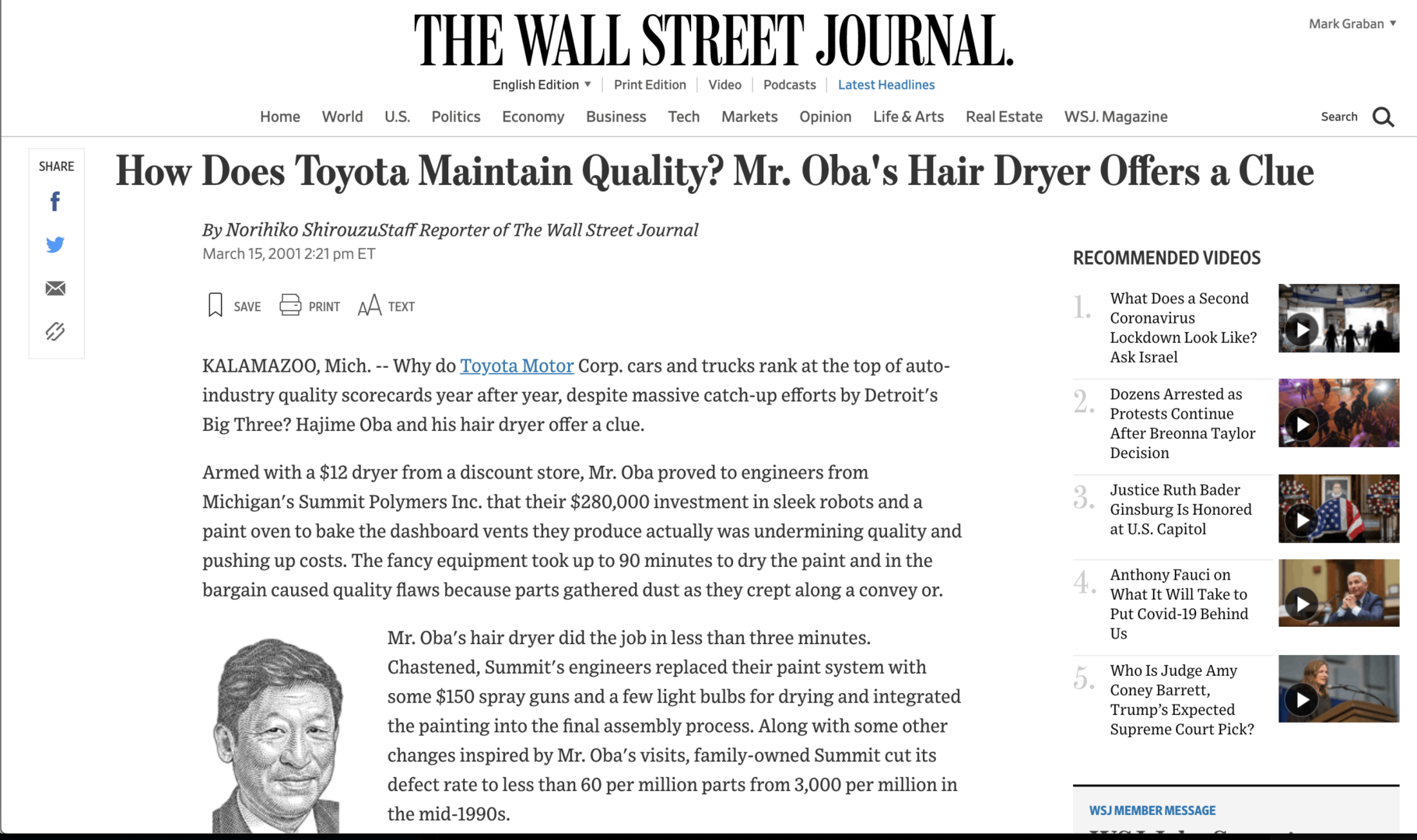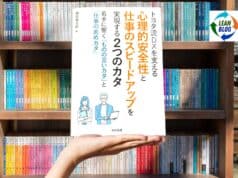I've seen a number of people post on LinkedIn about the passing of the legendary “Mr. Oba” of Toyota (sometimes spelled “Mr. Ohba”) — Hajime Oba passed away on September 4th, in Connecticut.
I've heard many stories from people who were taught and deeply influenced by Mr. Oba. In 1999 or 2000, one of Mr. Oba's sons was hired at Dell Computer and that was a big deal amongst the Lean geeks at the company. I'll be recording a podcast soon with his son who continues to do Lean work and worked closely with Mr. Oba over the years.
Mr. Oba was well known and respected for, among other things, starting up the Toyota TSSC group that works with suppliers, other manufacturers, and nonprofits (see posts about them helping a food bank, a children's hospital, and an eye clinic. Mr. Oba had a career at Toyota that spanned more than 50 years.
This week, I released a podcast with Steve Spear where he shares recollections of learning directly from Mr. Oba during his PhD work at Harvard Business School. I hope to interview others from my circles who I know were influenced by Mr. Oba.
I remember this Wall St. Journal article from 2001 about Mr. Oba:
How Does Toyota Maintain Quality? Mr. Oba's Hair Dryer Offers a Clue

The article starts with a story that seems to encapsulate the mantra of “creativity over capital,” hence the reference to the hair dryer in the headline.
“Armed with a $12 dryer from a discount store, Mr. Oba proved to engineers from Michigan's Summit Polymers Inc. that their $280,000 investment in sleek robots and a paint oven to bake the dashboard vents they produce actually was undermining quality and pushing up costs.”
Why was TSSC (originally called the Toyota Supplier Support Center) needed? In 2001…
“As Toyota expands its U.S. output, it will be forced to rely more on American suppliers who haven't grown up steeped in the auto maker's obsessive production philosophy, known as “lean manufacturing.”
Not to get too sidetracked, but some readers will likely take issue with “Lean” being used as a synonym for the “Toyota Production System.” Another upcoming podcast features a leader from a company that is part of the Toyota Industries umbrella — and they use the word Lean (again inside a Toyota company) as a synonym for TPS or the Toyota Way.
There was a prediction (a boast?) in that 2001 article from a Ford leader:
“We believe we will start getting to Toyota's levels of lean competitiveness in three to five years,” he says.
How did that play out?
In the article, Mr. Oba was asked about other automakers trying to copy Toyota, and he said that they simply “use lean techniques simply as a way to slash inventory and are satisfied with that.”
Lean is, of course, far more than methods for achieving low inventory.
“What the Big Three are doing is creating a Buddha image and forgetting to inject soul in it,” [Oba] says.
Forgetting to inject the soul… that reminds me of an old FORTUNE article (from 1997) about the “soul of Toyota”:
“Toyota's showing the opposition how it makes cars is a bit like Coke's giving Pepsi a peek at its secret syrup formula. The Toyota Production System on display at Georgetown applies not just to manufacturing but also to almost everything Toyota does, from product development to supplier relations and distribution. But Toyota officials don't mind. Deep down, they know that the TPS techniques that visitors see on their tours–the kanban cards, andon cords, and quality circles–represent the surface of TPS but not its soul. Toyota isn't worried about giving away any important secrets on a plant tour.”
Steve Spear wrote about some of that “soul” in his seminal article “Decoding the DNA of the Toyota Production System.” In our podcast, coming soon, Spear says he could have called the article “Decoding the DNA of Mr. Oba.”
The WSJ article has stories about Mr. Oba working with auto suppliers, where he emphasized quality, embracing the complete system (not implementing pieces of it “half heartedly,” and the need to commit to no layoffs.
“When Mr. Oba began working with Summit in 1993 to transform the Mt. Sterling plant into a lean producer, almost immediately he met resistance from hourly workers. The workers assumed Mr. Oba was a harbinger of eventual job losses — unaware that Toyota has a policy against linking job cuts with its lean manufacturing initiatives.”
The final quote from Mr. Oba in the article:
“Toyota may be just 1% better than the Big Three,” he says, “But that's all it takes to get all the recognition and a ton of consumer acceptance.”
Let's all continue working to be 1% better every day… to be better than our competitors and to work toward the ideal state…
Rest in peace, Mr. Oba. Thank you for inspiring so many people that have then, in turn, coached, mentored, and inspired me.
Did you have the chance to work with Mr. Oba and to learn from him? If so, please add comments to this post.
Here is a podcast that I did with Steve Spear sharing reflections on learning from Mr. Oba:
More to come…
What do you think? Please scroll down (or click) to post a comment. Or please share the post with your thoughts on LinkedIn – and follow me or connect with me there.
Did you like this post? Make sure you don't miss a post or podcast — Subscribe to get notified about posts via email daily or weekly.
Check out my latest book, The Mistakes That Make Us: Cultivating a Culture of Learning and Innovation:









